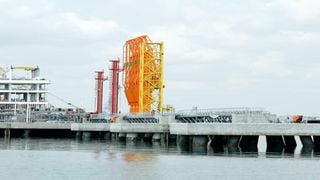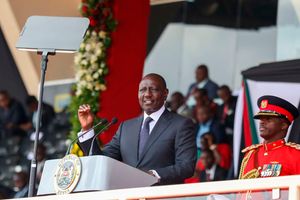
The new Kipevu Oil Terminal.
| Kevin Odit | Nation Media GroupMombasa
Premium
New Kipevu terminal to double Kenya’s petroleum handling capacity
What you need to know:
- The new terminal is an off-shore facility at the port of Mombasa, opposite to the old one.
- It can handle three types of white oil products - aviation fuel, diesel and petrol.
With the Sh40 billion Kipevu oil terminal in Mombasa now completed, Kenya wants to double its petroleum products handling capacity from the current 35,000 tonnes.
President Uhuru Kenyatta is scheduled to inspect the facility with Chinese foreign affairs minister Wang Yi and to conduct a dry run.
The terminal was financed by the Kenya Ports Authority (KPA) and built by China Communication Construction Company. It can handle up to four vessels at once while the existing one can take just one.
The new terminal is an off-shore facility at the port of Mombasa, opposite to the old one. It has four berths, whose total length is 770 metres, and one work boat wharf in the Westmont area for landing facilities.
It also has five pipelines buried 26 metres under the seabed to allow for future dredging of the channel without interfering with the infrastructure.
KPA acting managing director John Mwangemi said the new facility is capable of handling six different hydrocarbon import and export products. It is also fitted with liquefied petroleum gas (LPG), crude oil and heavy fuel oil facilities.
It can handle three types of white oil products - aviation fuel, diesel and petrol.
The new terminal “will effectively replace the old Kipevu Oil Terminal situated on the mainland Port Reitz” built in 1063, he said.
Cost of petroleum
Mr Mwangemi said the terminal is faster and more modern and will improve the economy of the region as it will reduce the cost of petroleum because vessel turn-around time will be cut from four to two days.
KPC expects the cost of gas to drop by 30 percent once the facility opens.
Business Daily has established that KPC is in talks with the Ministry of Energy to set up a dedicated LPG storage facility with an initial capacity of 25,000 tonnes.
The facility should be completed within three years, said KPC infrastructure development general manager David Muriuki in an earlier interview.
KPC has proposed a 500-tonne-per-day LPG truck loading facility that will enhance product evacuation and subsequently reduce demurrage costs.
The planned system comes as LPG prices have hit levels seen six years ago after the State reintroduced a 16 per cent value-added tax (VAT) on cooking gas.
KPC usually receives imported LPG from ships at the Shimanzi oil terminal and stores it in tanks at the Changamwe facility.
Cost of the project
The product is then evacuated to local terminals through inter-connecting pipelines for bottling and loading onto trucks.
The new LPG terminal will have two offloading lines, with KPC getting rights for one line and private companies the other.
In petroleum industry parlance, a Common User Manifold (CUM) can connect importers to a single piece of infrastructure they can use to access their products from different ports.
Environment watchdog Nema said at least 20 companies had expressed interest in building and owning a stake in the second line but only seven presented their documents for evaluation.
But even as the project is set to open at the end of this year, it has had its share of troubles. In September 2019, the Ethics and Anti-Corruption Commission summoned top KPA officials who had allegedly inflated the cost of the project by Sh28 billion.
People familiar with the matter said the project was initially estimated to cost Sh12 billion, which was later raised to Sh25 billion and then Sh40 million.
At the centre of the investigation was the awarding of the construction tender to CCCC though the firm had not fulfilled the conditions in the KPA bid document.
Kenya and China are expected to sign a number of bilateral agreements and memoranda during President Kenyatta’s planned tour.





